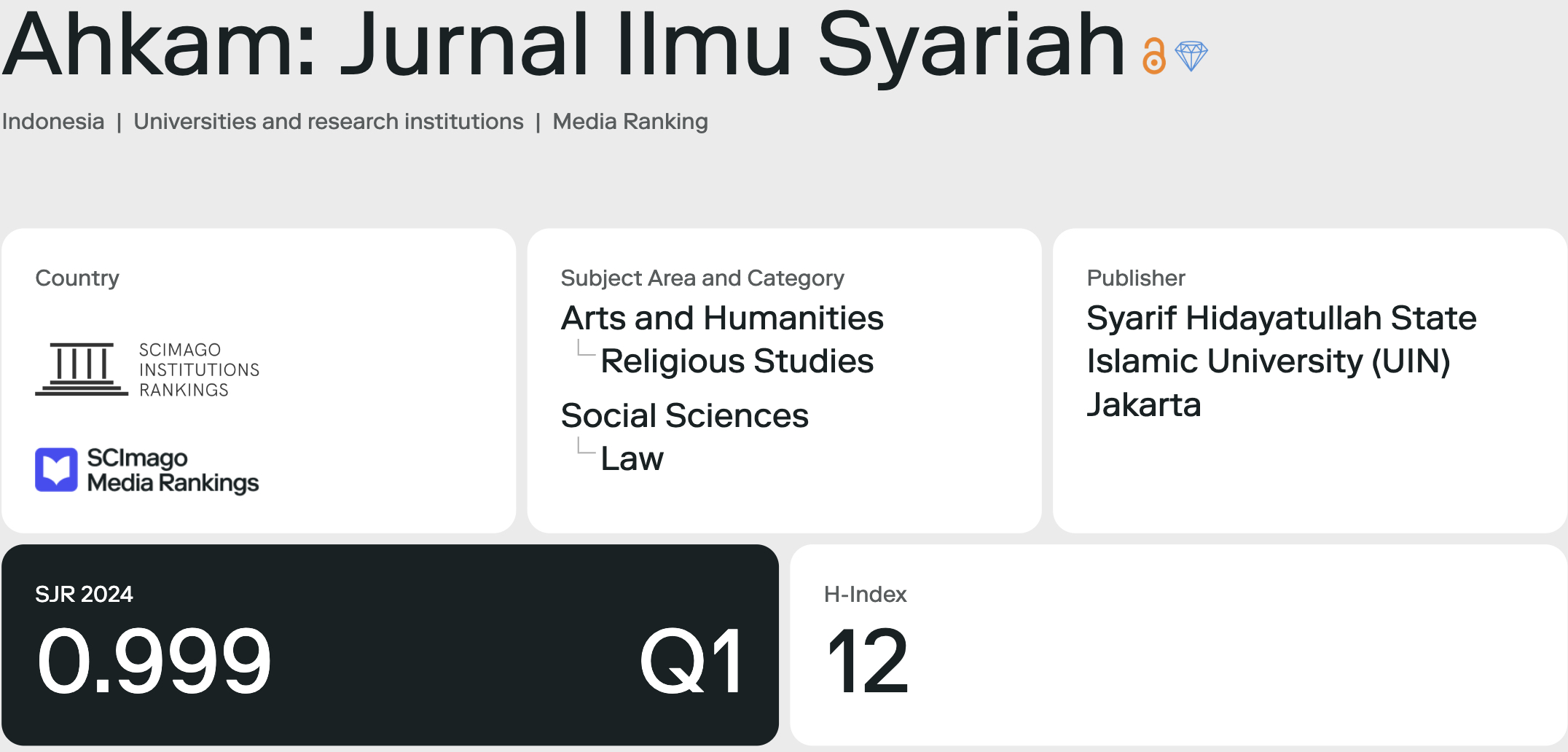Religion and Nationalism in Shaping the Fiqh of Armed Jihad: A Lesson to the Indonesian National Counterterrorism Policy
DOI:
https://doi.org/10.15408/ajis.v22i2.26130Abstract
Understanding the formulation of the fiqh of jihad is a key success in countering violent Islamist extremism and terrorism. Two salient factors that often come up in the academic discussion of the making of violent jihad are nationalism and religion. The present study investigates these two crucial related factors in the two prominent cases of armed jihad in Iran (1980-1988) and Palestina (1990-2010); and, then, how they may provide a lesson to the counterterrorism policy in Indonesia. The study uses secondary data to investigate the making of violent jihad of Iran and the Palestinian Hamas. While in the case of Indonesian policy, this article uses a government report on counterterrorism and interviews with the state counterterrorism authorities. This study shows that the interactions of two ideologies (religion and nationalism) together create a sustained and powerful force of a violent jihad by the Iranians during the Iraq-Iran War and Palestinian Hamas against Israel to achieve their political goals. In contrast to this practice, Indonesia has applied nationalism in counterterrorism policies as a strategy to deradicalize violent ideology with religious motives. This article shows that counterterrorism policies need to put more emphasis on the meaning of non-violent jihad.
Keywords: religion; nationalism; jihad; counterterrorism
Abstrak
Memahami fikih jihad merupakan kunci keberhasilan dalam melawan ekstrimisme dan terorisme. Dua faktor yang sering muncul dalam diskusi akademis tentang pembentukkan wacana jihad kekerasan adalah nasionalisme dan agama. Studi ini menyelidiki dua faktor penting dalam kasus jihad bersenjata di Iran (1980-1988) dan Palestina (1990-2010); dan bagaimana kasus ini menjadi pertimbangan dalam kebijakan kontraterorisme di Indonesia. Studi ini menggunakan data sekunder untuk menyelidiki pembentukkan jihad kekerasan di Iran dan Hamas Palestina. Pada konteks Indonesia, penelitian ini menggunakan laporan pemerintah tentang kontraterorisme dan wawancara dengan otoritas terkait. Hasil penelitian menunjukkan bahwa interaksi dua ideologi (agama dan nasionalisme) secara bersama-sama menciptakan kekuatan jihad kekerasan yang signifikan dan berkelanjutan di Iran selama Perang Irak- Iran dan Hamas Palestina melawan Israel dalam mencapai tujuan politik. Berbeda dengan praktik tersebut, Indonesia menggunakan nasionalisme dalam kebijakan kontraterorisme sebagai strategi melawan ideologi kekerasan bermotif agama. Artikel ini menunjukkan bahwa kebijakan kontraterorisme perlu lebih menekankan pada pemaknaan jihad tanpa kekerasan.
Kata Kunci: agama; nasionalisme; jihad; penanggulangan terorisme
References
Al Uyairi, Syaikh Yusuf. (2007). Mulimah Berjihad, Peran Wanita dalam Medan Jihad. Translated by Fajrun Mustaqim. Solo: Media Islamika.
Al-Atsari, Abu Abdurrahman. (2008). Memusuhi Penguasa Murtad. Translated by Wahyudin bin Rayidin. Solo: Media Islamika.
Alshech, Eli. (2008). “Egoistic Martyrdom and Ḥamās' Success in the 2005 Municipal Elections: A Study of Ḥamās Martyrs' Ethical Wills, Biographies, and Eulogies,” Die Welt des Islams, New Series, Vol. 48, Issue 1, pp. 23-49.
As-Salim, Muhammad bin Ahmad. (2013). 39 Cara Membantu Mujahidin. Translated by Abu Ja’far Al-Indunisy. Solo: Media Islamika.
Atran, Scott. (2006). “The Moral Logic and Growth of Suicide Terrorism” The Washington Quarterly. The Center for Strategic and International Studies and the Massachusetts Institute of Technology. 29:2 pp. 127–147.
Ayoob, M. (2008). The Many Faces of Political Islam. Ann Arbor: University of Michigan Press,8.
Azis, Syaikh Abdul Qodir bin Abdul. (2007). Thatbiq Syari’ah, Menimbang Status Penguasa yang Menolak Syari’at. Translated by Abu Musa Ath-Thayyar. Solo: Media Islamika.
Bonner, M. (2002). Jihad in Islamic History: Doctrin and Practice. Princeton University Press. https://books.google.co.id/books?id=Qxq7eykoJgoC
Calhoun, Craig. (1983). “The Radicalism of Tradition: Community Strength or Venerable Disguise and Borrowed Language?” American Journal of Sociology 88:886-914.
Cook, D. (2007). Martyrdom in Islam. New York: Cambridge University Press.
Cook, D. (2015). Understanding Jihad. Berkeley: University of California Press. https:// books.google.co.id/books?id=SqE2DwAAQBAJ
Daud, A I M., Huda, R., & Arifin, A. (2008). The Secret of Jihad Moro, Fakta-fakta Perlawanan Kaum Tertindas Muslim Moro. Solo: Media Islamika.
El-Husseini, Rola. (2008). “Resistance, Jihad, and Martyrdom in Contemporary Shi`a Thought”, The Middle East Journal, Vol. 62 (3), 399-414.
El-Yousfi, A. (2020). The Anthropology of Islam in Light of the Trusteeship Paradigm. In Islamic Ethics and the Trusteeship Pradigm: Taha Abderrahmane’s Philosophy in Comparative Perspective (197-217). Brill.
Feniger, Y., & Ayalon, H. (2015). English as a Gatekeeper: Inequality between Jews and Arabs in access to Higher Education in Israel. International Journal of Educational Research, 76, 104–111. https://doi.org/10.1016/j. ijer.2015.04.003
Gupta, Dipak K. and Kusum Mundra. (2005). “Suicide Bombing as a Strategic Weapon: An Empirical Investigation of Hamas and Islamic Jihad,” Terrorism and Political Violence, 17(4), 573–598.
Halimah, Abdul Mun’im. (2007). Tiada Khilafah Tanpa tauhid & Jihad: Jalan Memulai Kehidupan Islami dan Tegaknya Khilafah Rasyidah sesuai Al-Quran dan As-Sunnah. Translated by Abu Sulaiman Aman Abdurraman. Jakarta: Arrahmah Media.
ICG. (2004). Dealing with Hamas.
Israeli, R. (2002). State and Religion in the Emerging Palestinian Entity. J. Church & St., 44, 229.
Keppel, G. (2002). Jihad: The Trial of Political Islam, trans. by Anthony F. Roberts. Cambridge: Harvard University Press.
Munajat, M. (2022). The Battle of Ideology: Seeking the Strategy for Indoctrinating Pancasila for Those Who Are Anti-Pancasila. Millati: Journal of Islamic Studies and Humanities, 7(1), 1–17.
Pedoman Umum Perjuangan Al-Jam’ah Al-Islamiyyah, (1996).
Peraturan Pemerintah Republik Indonesia Nomor 77 Tahun 2019 tentang Pencegahan Tindak Pidana Terorisme dan Pelindungan Terhadap Penyidik, Penuntut Umum, Hakim, dan Petugas Pemasyarakatan.
Peraturan Presiden Republik Indonesia Nomor 7 Tahun 2021 tentang Rencana Aksi Nasional Pencegahan dan Penanggulangan Ekstremisme Berbasis Kekerasan yang Mengarah pada Terorisme Tahun 2020-2024.
Peters, R. (1996). Jihad in Classical and Modern Islam. Princeton: Markus Wiener Publishers, 103-148.
Razoux, P., & Elliott, N. (2015). The Iran-Iraq War. Harvard University Press. http://www.jstor.org/stable/j.ctvjk2vcj
Robert, P. (2005). Dying to Win: The Strategic Logic of Suicide Terrorism. Random House, New York.
Robinson, G. E. (2004). “Hamas as Social Movement,” Islamic Activism, a Social Movement Theory Approach, ed. Quintan Wiktorowicz. Indiana: Indiana University Press, 112-139.
Sagemen, Marc. (2004). Understanding Terror Networks. Philadelphia: University of Pennsylvania Press. https://doi.org/doi:10.9783/9780812206791
Scham, P. and Osama Abu-Irshaid. (2009). Hamas Ideological Rigidity and Political Flexibility. United States Institute of Peace.
Schulze, K. E. (2019). From Ambon to Poso: Comparative and Evolutionary Aspects of Local Jihad in Indonesia. Contemporary Southeast Asia, 41(1), 35–62. https://www.jstor.org/stable/26664204
Supardi, Staff in a Nusakambangan prison, personal communication, 13 February 2022.
Sabirin, Staff of the Department of Corrections in a Nusakambangan prison, personal communication, 19 December 2021.
Syahid, Terorist prisoner in a Nusakambangan prison, personal communication, 13 February 2021
Syakirin, Terorist prisoner in a Nusakambangan prison, personal communication, 19 December 2021
Undang-Undang No. 15 Tahun 2003 tentang Penetapan Peraturan Pemerintah Pengganti Undang-Undang Nomor 1 Tahun 2002 tentang Pemberantasan Tindak Pidana Terorisme Menjadi Undang-Undang
Undang-Undang No. 5 Tahun 2018 tentang Perubahan atas UU No. 15 Tahun 2003 tentang Penetapan UU No. 1 Tahun 2002 tentang Pemberantasan Tindak Pidana Terorisme menjadi Undang-Undang.
Undang-Undang No. 9 Tahun 2013 tentang Pencegahan dan Pemberantasan Tindak Pidana Pendanaan Terorisme.
Woods, K. M., Murray, W., Nathan, E.A., Sabara, L., & Venegas, A.M. (2013). Saddam’s Generals Perspectives of the Iran-Iraq War. Virginia, Institute for Defense Analyses. https://www.files.ethz.ch/isn/146268/Saddams%20Generals.pdf
Zulfikar, M., and A. Aminah. (2020). "Peran Badan Nasional Penanggulangan Terorisme Dalam Pemberantasan Terorisme di Indonesia," Jurnal Pembangunan Hukum Indonesia, vol. 2, no. 1, pp. 129-144, Jan. 2020. https://doi.org/10.14710/jphi.v2i1.129-144.








